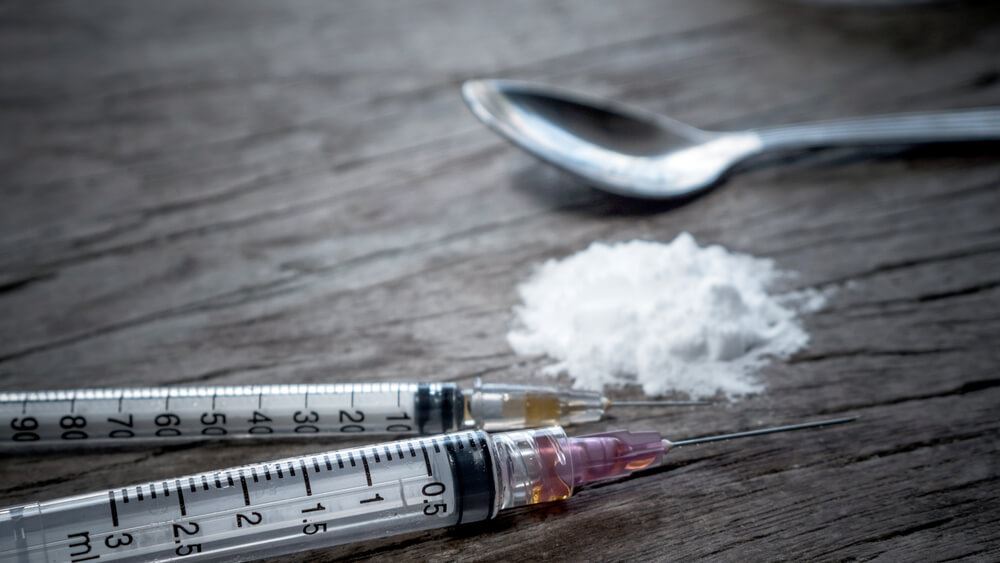

Working To Make Your Recovery Affordable By Accepting Most Insurances
Do not be discouraged if you are not seeing your insurance provider listed on our website. We take many types of insurance! Call Today: (844) 292-5010
-
 In-Network: BCBS
In-Network: BCBS -
 In-Network: Aetna
In-Network: Aetna -
 In-Network: Tricare
In-Network: Tricare -
 In-Network: Cigna
In-Network: Cigna -
 Proudly Caring for Veterans
Proudly Caring for Veterans -
 In-Network: Carelon
In-Network: Carelon -
 In-Network: MultiPlan
In-Network: MultiPlan -
 In-Network: HMC
In-Network: HMC
Heroin Addiction Treatment in Prescott, AZ
Are you or a loved one struggling with heroin use? Has it become an addiction that has damaged parts of your personal and professional life? The first step in recovery is admitting you have a problem, and the second step for so many people is coming to Decision Point Center located in Prescott, Arizona.
We are a drug rehabilitation center that utilizes the tried-and-true Therapeutic Community model to guide you to recovery with comfort and creativity. We personalized our recovery programs to everyone who comes to us for help, which plays a major role in securing lasting sobriety.
Call (844) 292-5010 or contact us online to schedule an appointment and learn more about heroin addiction treatment in Arizona.
When we take in a new client, we review the following to customize their treatments:
- Information regarding past family trauma
- Job or career expectations
- Nutritional and medical needs
- Psychiatric and psychological evaluations, if any exist
Everything can play a role in why you began using or become addicted to heroin, so we leave nothing overlooked when designing your recovery program. It is all part of the Decision Point Center difference that sets us apart from other rehabilitation centers in Arizona.
On This Page:
- Heroin Addiction Treatment Programs Tailored to You
- What Is Heroin?
- Warning Signs of Heroin Addiction
- Symptoms of Heroin Withdrawal
- Long-Term Effects of Heroin Use
- How to Help a Heroin-Addicted Loved One
- Prioritizing Your Comfort, Recovery & Convenience
- Heroin Rehab FAQs

The path to recovery and sobriety can be intimidating when you travel it alone. Thanks to the genuinely caring and compassionate professionals at Decision Point Center in Arizona, you do not need to continue without support and real guidance. We take the time to get to know you and your unique situation so we can be confident that we are providing the best possible heroin addiction treatments and therapies, and never anything created in a “cookie-cutter” process.
Programs and treatments that might interest you include:
- Residential inpatient program
- Eye Movement Desensitization and Reprocessing (EMDR)
- Career and educational counseling
- Cognitive behavioral therapy (CBT)
- Extended residential treatment
- Family therapy
- Relapse prevention program
- Trauma therapy
Treatment for heroin addiction starts by administering medically monitored detox to eliminate the substance from your body. As soon as you are stabilized and not affected by the physical effects of heroin, you will ready to overcome your addition through our inpatient care and available programs. Since we understand that everyone doesn’t recover in the same way and at the same time, we are also prepared for long-term recovery.
Heroin is an opiate drug derived from poppy plant seeds. It can take the form of white powder, brown powder, or black tar. The drug can be injected, smoked, or snorted, giving users a feeling of euphoria, warm feeling to the skin, and relaxation. Unfortunately, dependency can result in physical and psychological withdrawals that leaves addicts feeling miserable without the drug.
Heroin is considered one of the most addictive drugs in the world. According to the 2020 National Survey on Drug Use and Health, roughly 691,000 people in the United States meet the clinical requirements for heroin use disorder. Over the past couple decades, many people have developed a heroin addiction after taking painkillers for pain. After exhausting their prescriptions, they often turn to heroin.
If you suspect someone you know may be addicted to heroin, pay close attention to their home, their physical characteristics, and their lifestyle habits to identify certain telltale signs. Identifying the truth and depth of the problem is the first step towards supporting your loved one's long-term sobriety.
Signs of heroin addiction include:
- Slurred speech
 Needle marks
Needle marks- Dilated or constricted pupils
- Hostile or erratic behavior
- Poor job or academic performance
- Isolation from friends and loved ones
- Stealing money for drugs
- Significant weight loss
- Shortness of breath
- Constant itching
Contact our Arizona heroin rehab specialists today to learn more about our services
Users typically begin experiencing withdrawal symptoms between 6 and 12 hours after their last dose. Heroin withdrawal symptoms are often similar to those of prescription opioids, though because heroin leaves the user's system more quickly than painkillers, withdrawal symptoms have an earlier onset.
The following are symptoms of heroin withdrawal:
- Intense cravings
- Nausea
- Vomiting
- Cold sweats
- Chills
- Bone and muscle pain
- Fever
- Anxiety
- Severe cramping
- Insomnia
The duration of heroin withdrawal will vary depending on the length of time the user abused heroin, the size of doses they took each time, how often they used, the method of which they used (injecting, smoking, etc.), and whether or not they suffer from additional physical or mental health issues.
Here are the long-term effects of heroin addiction:
- Heart disease
- Liver disease
- Seizures
- Infections
Effective treatment for heroin addiction is required to eliminate or reduce withdrawals and the negative consequences of continued use in order to improve our patients’ well-being. Our staff is committed to reducing dependency, reducing criminal behavior, improving physical and mental health, and helping patients reenter the employment field and become integrated into society once again.
If you know someone struggling with heroin addiction, urge them to seek help. While it may be uncomfortable to approach them about their struggles, speaking up and letting them know you are concerned could potentially be the push they need to turn their life around. You could be saving their life.
If your loved one is in need of heroin addiction treatment:
- Learn as much as you can about heroin addiction so you can better empathize with their situation and understand exactly what they are going through.
- Approach them from a place of compassion, not judgment.
- Plan out what you want to say in advance. If it helps, write down your thoughts and feelings.
- Understand that they may react negatively. They may not realize the extent of their addiction or they may be in denial. Be persistent, but understand that you cannot force someone to seek help.
- If they agree to seek treatment, stay involved in their recovery. Be the support they need when they need it most.
- If your loved one refuses to acknowledge an obvious problem, consider staging an intervention with professional help.
You are seen as the individual you are at our Arizona heroin rehab and detox center. When heroin addiction has caused you to suffer serious health complications, to lose a job, or to destroy valued personal or romantic relationships, we are here to make certain you have the strength and the tools needed to recover. We do whatever we can to reduce the stress of the overall situation, including accepting most major insurance plans and providing useful information about addiction to your family so they can better support you during this time as well.
Heroin Rehab FAQ
What Can I Expect During Heroin Rehab at Decision Point Center?
At Decision Point Center, our heroin rehab program begins with a medically supervised detox to help manage withdrawal symptoms safely. After detox, you’ll enter the rehabilitation phase, which includes a combination of individual therapy, group therapy, and holistic approaches. We focus on addressing both addiction and any underlying mental health conditions, such as anxiety or depression.
Our goal is to help you build healthy coping mechanisms, improve emotional well-being, and develop strategies for long-term recovery. You’ll also participate in educational sessions designed to help you understand the nature of addiction and relapse prevention. The treatment plan is personalized based on your unique needs.
How Long Will My Heroin Rehab Last?
The duration of rehab varies depending on your individual situation and progress. Typically, heroin detox takes about 7-10 days. The rehabilitation phase may last anywhere from 30 to 90 days, depending on the severity of the addiction and any co-occurring mental health disorders. Longer programs allow for deeper healing and better prepare you for the transition back to everyday life. Our team will work closely with you to determine the right length of treatment and ensure you're ready for each step of your recovery.
Is Heroin Rehab at Decision Point Center Covered by Insurance?
Yes, heroin rehab is often covered by insurance, but coverage can vary depending on your provider and plan. We partner with many insurance companies and are happy to help you navigate the insurance process. Our team will assist with verifying your coverage and discussing any potential out-of-pocket costs. If insurance does not cover the full cost of treatment, we offer flexible payment options and financing solutions to make care more accessible.
You can learn more about our in-network providers and other insurance coverage matters here.
How Can I Prepare for Heroin Rehab?
Preparing for rehab involves making logistical arrangements like taking time off work, arranging for childcare, or asking a loved one to handle your bills. It’s also helpful to mentally prepare by understanding that rehab is a safe place where you can focus solely on your recovery. Trusting the process and committing to it fully can improve your outcomes.
Will I Be Able to Work or Go to School While in Heroin Rehab?
In outpatient rehab, it is possible to maintain a job or attend school while undergoing treatment. However, for inpatient rehab, you will need to take a leave of absence. Focusing on your recovery is essential, and many employers and schools provide support for individuals seeking treatment, including medical leave or academic accommodations.
We can help evaluate what type of rehab is best for you and discuss options like our intensive outpatient program (IOP), which offer patients a structured program while still allowing them to work, go to school, and attend to other responsibilities.
What are the challenges of recovering from heroin addiction?
Challenges include managing cravings, avoiding triggers, building strong support systems, and coping with stress and anxiety. Relapse is common, but with continued treatment and support, many people can overcome these challenges.
How does heroin addiction affect the brain?
Heroin alters the brain's reward system, leading to intense cravings and compulsive drug-seeking behavior. It can also damage brain cells and impair cognitive function.
What are some tips for preventing heroin addiction?
Educate yourself about the dangers of heroin, avoid risky behaviors, build strong relationships, and seek help early if you or someone you know is struggling with substance abuse.
What is the role of family and friends in the recovery process?
Family and friends play a crucial role in supporting individuals in recovery. They can provide emotional support, encourage healthy behaviors, and help establish a strong support network.
What Happens After I Complete Heroin Rehab?
After completing heroin rehab, your recovery journey continues with aftercare. This can include continued therapy, participation in support groups like Narcotics Anonymous, and follow-up care with your treatment team. Decision Point Center provides resources for sober living arrangements if needed and offers ongoing relapse prevention support to help you maintain sobriety. We focus on empowering you with tools to navigate the challenges of daily life while avoiding triggers that could lead to relapse. Our aftercare plan is tailored to support your long-term recovery and personal goals.

Real Clients. Real Recoveries.
-
“Thank you for helping me navigate through one of the most difficult times in my life. I really attribute my experience while in your care to saving my life and career.”- Phil O.
-
“Doug and Wade really helped me and my loved ones through a tough time.”- J.C.
-
“Steve in admissions was extremely helpful for our family as we tried to choose a program recently.”- Paula A.
-
“Decision Point was different from the beginning. A team approach from professionals who care.”- Candace
-
“Thank you for helping me be a better person. Doug and Wade really helped me and my loved ones through a tough time.”- JD
-
“The moment I was in their hands, my transformation began. They actually cared. They actually WANTED to help me. I wasn't just another paycheck to them. They asked questions. They made a plan for me. And they followed it to the T.”- Amber B.
-
“THIS MAN MOVED MOUNTAINS to literally help save her!”- Corin C.
-
This facility deserves a special recognition. They have been around for years but the services they provide and the recovery that comes out of their facility, only seem to grow over the years. I have worked with Stephen from the admissions department and he has always gone above and beyond to make sure clients feel comfortable and get the care they need. I definitely recommend Decision Point Center!!!!- Ashley B.

We Understand You May Have Questions
Let Us Provide You With Answer
-
How Does Decision Point Determine My Treatment Plan?You are unique. Our commitment to, “You-based” treatment is at the forefront of what we do. Through one of the most comprehensive assessments in the treatment world today, we create, tweak, and refine your plan to provide a treatment experience uniquely tailored to your strengths, weaknesses and condition.
-
Can I Afford Treatment?Thanks to insurance plans and financing options, more people than ever before are able to receive the treatment they need. When you call our Admissions Team, they will leave no stone unturned in finding ways for you to obtain treatment including setting up a payment plan that meets your needs. You can even verify your insurance coverage here.
-
What If The 12 Steps Aren't My Cup of Tea?No problem. The 12 Steps is just one of many tools available to us at Decision Point and we firmly believe in finding the tools that best suit the individual. We’ll expose you to the 12 Steps of A.A. the way they were meant to be presented, but we’ll also introduce you to solid therapeutic alternatives if you desire.
-
Does Decision Point Center accept insurance?Yes! Decision Point Center works with many types of insurance to make treatment affordable for clients. Currently, Decision Point Center is in-network with BCBS, Humana, Cigna, PHCS, HMC Healthworks, Beacon Health Options, Tri-care, and Shasta. Decision Point Center also works with most PPO insurance companies.



Meet Our Dedicated Team
-
 Mary Ann Zuppardo Executive Director
Mary Ann Zuppardo Executive Director -
 Dr. Terry Vaughan Medical Director, Psychiatrist
Dr. Terry Vaughan Medical Director, Psychiatrist -
 Stephen Leza Director of Admissions & Business Development
Stephen Leza Director of Admissions & Business Development -
 Lindy Howard, MA, LPC Clinical Director
Lindy Howard, MA, LPC Clinical Director -
 Luke Bailey Director of Compliance
Luke Bailey Director of Compliance -
 Deborah Pallett, P.A. Physician Assistant
Deborah Pallett, P.A. Physician Assistant -
 Dr. Julia L. Summers, LPC DBT Therapist
Dr. Julia L. Summers, LPC DBT Therapist -
 Douglas Winter MS, LISAC, CSAT Primary Therapist
Douglas Winter MS, LISAC, CSAT Primary Therapist -
 Mark Branson, MA, LPC, NCC Trauma Therapist
Mark Branson, MA, LPC, NCC Trauma Therapist -
 Troy Trout Outdoor Activity Coordinator
Troy Trout Outdoor Activity Coordinator





















